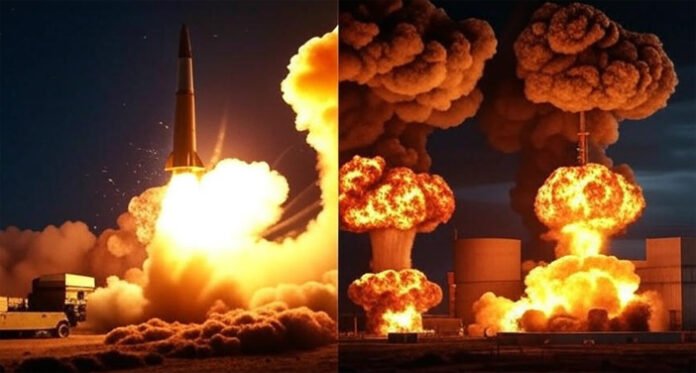
INVC NEWS
Middle East — : The Middle East is once again teetering on the edge of all-out war. On June 21, a historic escalation unfolded as the United States formally joined Israel in a direct military strike against Iran’s nuclear infrastructure. The operation, dubbed “Operation Midnight Hammer,” was greenlit by President Donald Trump, targeting three major nuclear facilities across Iranian territory. The aftermath has left the region reeling and global powers on high alert.
Massive Airstrikes Target Iran’s Nuclear Facilities
Under the direct command of President Trump, U.S. bombers launched precision-guided munitions in tandem with Israeli forces. According to official sources, the attack obliterated Iran’s key uranium enrichment hubs, dealing what Trump called “monumental damage” to Iran’s long-contested nuclear ambitions.
Israeli warplanes, reportedly including F-35 stealth fighters, continued pounding Iranian missile silos, command bunkers, and suspected centrifuge storage centers. Israeli intelligence claims that the nuclear program has been “set back by at least a decade.”
Satellite imagery reviewed by defense analysts confirms large-scale structural devastation at Natanz, Fordow, and Arak — Iran’s most heavily fortified nuclear zones.
Human Toll Rises: 400 Dead, Thousands Injured in Iran
The Iranian Health Ministry released grim figures following the joint U.S.-Israeli air campaign. Over 400 Iranians have been confirmed dead, and more than 3,000 have suffered injuries, many in critical condition. Residential zones adjacent to military targets have been hit, raising concerns of civilian collateral damage.
Tehran has declared a national state of emergency, with hospitals overrun and emergency shelters packed to capacity. Mass funerals have begun across cities like Isfahan, Yazd, and Shiraz, fueling public outrage and mass protests against what Iranian officials describe as “blatant acts of terrorism” by the West.
Iran’s Missile Retaliation: Hospitals and Cities Under Fire
Iran’s Supreme Leader Ayatollah Ali Khamenei vowed that “America and the Zionist regime will pay an unbearable price.” Within 48 hours, Iran launched a counterstrike campaign, firing ballistic and cruise missiles into northern and central Israel.
One missile struck a hospital in Haifa, resulting in multiple casualties, including medical staff and patients. Emergency services in Israel reported 24 deaths, and at least 70 others have been hospitalized due to debris and blast injuries.
Iran’s Islamic Revolutionary Guard Corps (IRGC) confirmed responsibility for the attacks, stating they used Fateh-110 and Zolfaghar missiles, both capable of carrying high-explosive warheads with devastating precision.
Air Raid Sirens and Mass Evacuations in Israeli Cities
As missile strikes intensified, air raid sirens echoed across Tel Aviv, Haifa, and Jerusalem, sending millions scrambling for underground shelters. The Israeli Defense Forces (IDF) responded by intercepting a number of projectiles using the Iron Dome and David’s Sling missile defense systems, but several still breached defenses, causing widespread panic and property damage.
Local authorities have begun evacuating vulnerable zones, including schools, hospitals, and high-density neighborhoods. The Israeli Home Front Command has placed the country on Level 4 Emergency Alert, urging citizens to stockpile food, water, and medical supplies.
Global Shockwaves: NATO, Russia, and China React
The conflict’s rapid escalation has drawn global condemnation and concern. NATO officials held an emergency session in Brussels, with member states urging de-escalation and calling for a ceasefire. Russia has condemned the U.S. and Israel’s actions as “provocative warmongering,” while China called for a “balanced approach” and offered to host emergency talks in Beijing.
The UN Security Council has scheduled a closed-door session to address the crisis. Meanwhile, oil prices have surged over $150 per barrel, prompting fears of a global energy shock as tankers avoid the Strait of Hormuz, the world’s busiest oil chokepoint.
Operation Midnight Hammer: Inside the Tactical Strikes
The U.S. air campaign reportedly involved B-2 Spirit bombers, MQ-9 Reaper drones, and support from AWACS surveillance aircraft. The precision strikes took place in the dead of night, coordinated via encrypted NATO channels with Israeli command centers.
Military insiders revealed that cyber warfare units from both nations also launched simultaneous cyberattacks to disable Iran’s radar and air defense systems, including the Russian-supplied S-300 batteries near Qom and Bushehr.
According to Pentagon sources, this operation was months in planning, with war games and intelligence sharing ramping up since early 2025.
Iran’s Proxy Network Mobilizes: Hezbollah and Houthis Join In
As Tehran faces crippling losses, Iran’s regional allies are entering the fray. Hezbollah forces in southern Lebanon have launched rockets into northern Israel, prompting IDF artillery responses near the Golan Heights.
Meanwhile, Houthi rebels in Yemen have fired drones at U.S. naval assets in the Red Sea, with one attack damaging a U.S. Navy destroyer. The Pentagon confirmed retaliatory strikes on Houthi command centers in Sanaa and Hodeidah.
Iraqi Shiite militias have also begun mobilizing near U.S. bases in Baghdad and Erbil, raising fears of a wider proxy war stretching from Lebanon to Afghanistan.
Iranian Parliament Declares ‘Holy Resistance’
Iran’s Majlis (parliament) has declared the commencement of “Full National Resistance,” passing emergency wartime laws to enable conscription, national rationing, and total mobilization of economic assets.
Khamenei addressed the nation via televised broadcast, declaring the nation “united in sacrifice” and calling on the entire Islamic world to resist what he termed the “colonial onslaught by American-Zionist forces.”
Public broadcasts show massive recruitment drives, including militia training centers, weapon distribution to volunteers, and enlistment of teenage cadets in major cities.
Israel Vows More Strikes: Netanyahu Issues Ultimatum
Prime Minister Benjamin Netanyahu has stated that Israel will “not cease fire until Iran’s nuclear threat is permanently dismantled.” In a nationally televised statement, he emphasized Israel’s right to “preemptive defense”, citing the existential danger posed by Iran’s missile and nuclear programs.
Netanyahu gave Iran 48 hours to withdraw support from Hezbollah and cease further missile attacks or face “a response that will shake the region to its foundations.”
Israeli reservists have been called to duty, with mass troop deployments spotted near the northern and eastern borders.
Massive Cyber Attacks and Communications Blackouts
Both sides are now engaging in a shadow war of cyberattacks. Iran’s national electricity grid and internet access were disrupted following U.S.-led cyber intrusions. Conversely, several Israeli government websites and financial platforms were temporarily shut down by Iranian hacker groups, some linked to the IRGC’s elite cyber division, Shahid Kaveh Unit.
Social media in both countries has been heavily censored, with military censors blocking live footage and real-time updates. Independent journalists have struggled to verify reports, making the situation increasingly opaque.
Conclusion of Ceasefire Talks: Nowhere in Sight
At present, ceasefire negotiations remain off the table. With both sides entrenched in military posturing and nationalistic fervor, a diplomatic breakthrough appears unlikely in the short term.
The world watches as the confrontation intensifies, inching the Middle East closer to a conflict with implications that stretch far beyond its borders. Tensions are at their highest since the Gulf War, and with each passing hour, the stakes continue to rise.















